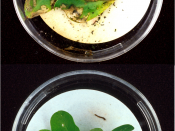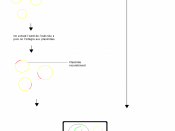As a result of biotechnology and its wake of controversy that follows, a number or organizations have voiced their concerns toward the corporate driven discipline. As a product of biotechnologies carelessness, or motives, activist groups have risen throughout the world opposing the novelty of genetically modified organisms. The intent of biotech companies is to market and eventually sell these innovations, eventually increasing their profits and stock prices so new products can be funded while the shareholders line their pockets. Opposing organizations which see biotechnologies incentives as a danger to society and the many other life forms that exist on our planet interrupts such a process.
Greenpeace is perhaps the biggest organization in opposition to genetically modified organisms. Greenpeace is an international environmental organization which fights to help protect and restore the environment. It is currently involved in a number of areas including; climate, toxics, nuclear, oceans, ocean dumping, forests and the somewhat novel area of genetic engineering.
According to Greenpeace, genetically modified organisms must not be released in the environment, as the consequences for the environment and evolution are unpredictable and irreversible (Greenpeace, 2000). Once released, the new living organisms made by genetic engineering are able to interact with other forms of life, reproduce, transfer their characteristics and mutate in response to environmental influences. In most cases they can never be recalled or contained. Any mistakes or undesirable consequences could be passed on to all future generations of life. Greenpeace addresses facts like these on their website, adding that the introduction of foreign species is a major cause of ecological disruption and erosion of biodiversity. For example, in the United States alone, 42% of the species on the threatened or endangered species list are at risk primarily because of non-indigenous species costing the US economy an estimated $123 billion a year (Greenpeace, 2000). Other activist organizations take a similar stand.
Another outspoken group opposing genetically modified organisms is the Sierra Club of Canada. The Sierra Club has been active in Canada since 1969, working on matters of public policy and environmental awareness. They also have local chapters and working groups in every region of the country. With their new, "Welcome to the Safe Food / Sustainable Agriculture Campaign," the Sierra Club is informing the public on the dangers of genetic engineering. They have started this campaign by distributing information packets and by making frequent visits to grocery stores notifying the public of engineered products which rest on the shelves.
With their in-your-face type of opposition, groups such as the Campaign for Food Safety and Family Farm Defenders speak out against genetic engineering. With its growing concerns on plants and animals other organizations branch off and concentrate on specific areas, such as the Environmental Defence Fund and The American Humane Society (Boyens, 2000). These organizations strive to address biotechnology from different, but interrelated perspectives in terms of environmental, health and animal consideration. Organizations such as these rely on their



![In an effort to reduce corn stem-borer infestations, corporate and public researchers partner to develop local [transgenic] Bt (Bacillus thuringiensis) corn varieties suitable for Kenya.](https://s.writework.com/uploads/10/102015/effort-reduce-corn-stem-borer-infestations-corporate-and-pub-thumb.jpg)

